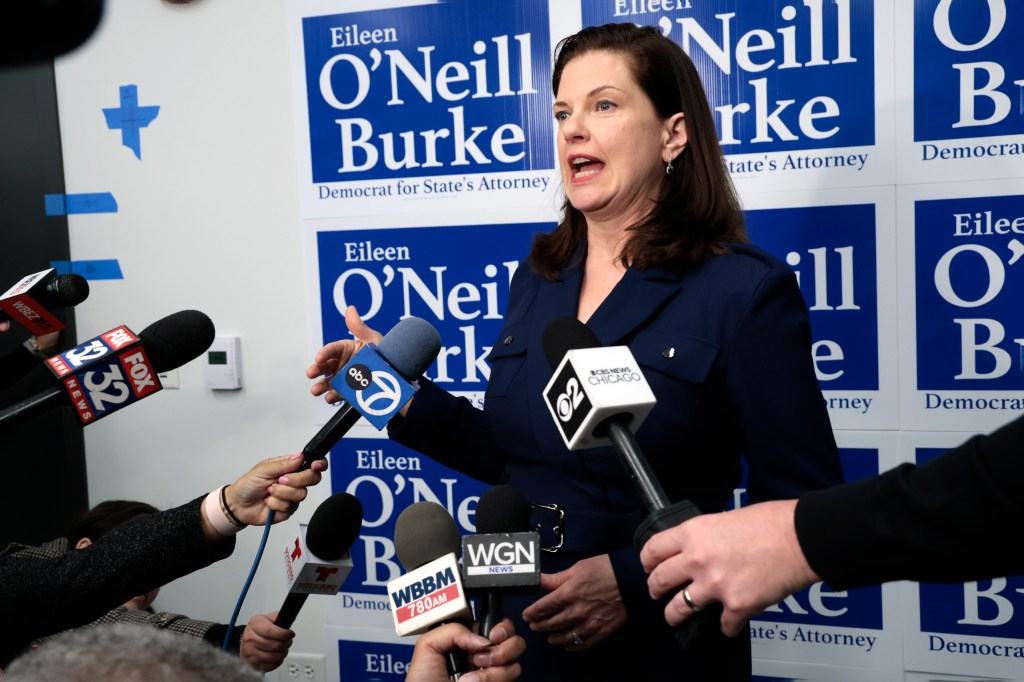Eileen O’Neill Burke won the Democratic nomination for Cook County state’s attorney by fewer than 1,600 votes. As the candidate who declared, “If you think things are going just fine right now, I’m not your candidate,” and whose ads market her as a departure from Kim Foxx, O’Neill Burke presents a puzzle: She both claims she will maintain the direction of many reforms created during Foxx’s eight-year tenure and positions herself publicly as a hard-line, tough-on-crime alternative.
Further complicating the matter is how O’Neill Burke narrowly won the primary. She won much of the northwest and southwest suburbs; endorsed by Chicago Fraternal Order of Police President John Catanzara, she also won Chicago wards known for heavy populations of law enforcement officers and first responders.
O’Neill Burke did not win the wards where crime rates are highest, and she did not win the wards where the majority population is Black or Latino. This is hardly insignificant in Chicago, where homicide rates for Black residents is 20% higher than that for white residents, and where around 80% of people pulled over by police for traffic stops are Latino or Black. O’Neill Burke was not elected by those most in danger of falling victim either to police profiling or violent crime.
We are appreciative of Foxx and the reforms she brought to Cook County during her tenure. She held police to a standard. She overturned wrongful convictions. She helped usher in the end of cash bail. She shifted her office’s focus from low-level crimes to violent offenses. She took heat from law enforcement and elected officials who weren’t accustomed to presenting full, documented cases to her office.
Especially considering O’Neill Burke ran in opposition to Foxx’s policies and given the wave sweeping progressive prosecutors out of office across America, we have concerns about the Democratic nominee’s true intentions to continue needed reforms. With the backing of the reactionary FOP president, with every major donor being white and male, O’Neill Burke especially needs to answer as to the specifics of how her office will resist the age-old structures that target and harm Black and brown communities.
From our perspective, the state’s attorney needs to place concern for citizens above fears of crime. This important balance plays out in two key areas: pretrial sentencing and wrongful convictions.
When it comes to pretrial sentencing, the state’s attorney must employ a sensitive lens to decipher between the innocent, those who need support and those who need to be detained. Major coalitions worked to see the passage of the Pretrial Fairness Act — not solely for its elimination of the old system of cash bail, but because it reduced the number of people who were detained before they were ever convicted of a crime. The act allowed for individuals accused of a crime to continue working at their jobs, to support their families and to meet with appropriate legal counsel.
In two major instances, O’Neill Burke has indicated she will retreat on these reforms. When it comes to pretrial fairness, her statements paint a punitive picture of how she would seek detention for “each and every” case of violent crime and for all gun charges. When it comes to retail theft, she has promised to pursue felony convictions at a threshold of $300 — compared with the $1,000 threshold of Foxx’s office — despite the fact that neighboring states such as Wisconsin, Michigan and Indiana all have higher thresholds. It is our position that the state’s attorney should follow the moral mandate of the Pretrial Fairness Act and seek pretrial detention on a case-by-case basis and not for entire categories of crime. The state’s attorney should stand behind strength of cases, not number of prosecutions.
We also have concerns about the continuing of work to overturn wrongful convictions, including the existence of the Conviction Integrity Unit. Under Foxx, this specialized unit worked to vacate more than 250 wrongful convictions. Most of these cases were connected to Chicago’s infamous police Sgt. Ronald Watts and Detective Reynaldo Guevara. However, far more cases are in the pipeline, extending well beyond cases tainted by those two officers and their accomplices. Cook County has been called the “False Confession Capitol of America” — but there’s active work of repair and restoration to be done for the human beings wronged by this corruption.
While we are glad O’Neill Burke has pledged to maintain the Conviction Integrity Unit, we have concerns about the pace and focus of its future work. Given comments O’Neill Burke has made regarding Chicago’s restorative justice courts simply being sites of “gun deferral,” we wonder if her proposed continuation of the conviction cause will be radically refashioned. We would hope that any radical changes made to the Conviction Integrity Unit or the Restorative Justice Bureau be made in partnership with the communities that have invested so much in the creation of these new avenues for serving justice.
In order to pursue justice and to inform the electorate fully, we call on O’Neill Burke to be far more specific about aspects of the state’s attorney’s office that are going in the right direction. It is time for her to share some specifics about her blanket comment, “If you think things are going just fine right now, I’m not your candidate.”
Then each of us can decide if she should be our candidate for state’s attorney.
Chicago faith leaders Rabbi Seth Limmer and the Rev. Otis Moss III, the Rev. Ciera Bates-Chamberlain and the Rev. Michael Pfleger joined the Tribune’s opinion section in summer 2022 for a series of columns on potential solutions to Chicago’s chronic gun violence problem. The column continues on an occasional basis.
Submit a letter, of no more than 400 words, to the editor here or email letters@chicagotribune.com.


